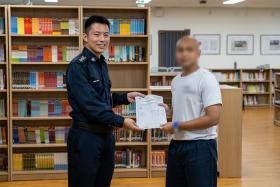Singapore to help all students progress regardless of starting point
MOE will review poly, ITE pathways to help them prepare for future
Singapore will press on with efforts to help students progress no matter their starting point, Education Minister Lawrence Wong said in Parliament yesterday.
His ministry is looking at how Institute of Technical Education (ITE) graduates can upgrade themselves and will review polytechnic and ITE pathways to better prepare students for future jobs.
It also plans to intervene early to help Primary 1 pupils with social and behavioural challenges, and will review the Primary 1 registration framework to see how it can increase the number of places set aside under Phase 2C.
Speaking during the debate on the Ministry of Education's (MOE) budget, Mr Wong outlined its priorities in the years ahead - equipping students with skills beyond book knowledge; providing flexible pathways; and developing students to their fullest potential, regardless of starting point.
Mr Wong said MOE has made key shifts to dial back on the overemphasis on academic results and increase flexibility in schools.
Building on these efforts, it is reviewing post-secondary education pathways, he said. For instance, the polytechnics are expanding their common entry programmes to allow students to discover their strengths before deciding on a specific diploma course.
Second Minister for Education Maliki Osman, who is leading the review of polytechnics and the ITE, said many of their graduates have expressed a desire to upgrade their qualifications.
MOE will relook ITE's curricula to allow its students to attain a Higher Nitec qualification within a shorter time, to meet its goal for all ITE graduates to upgrade beyond a Nitec qualification over the course of their careers by 2030.
Currently, about 30 per cent of Nitec graduates do not progress to higher Nitec courses or other publicly funded upgrading pathways.
Dr Maliki said: "Ultimately, continued training and deepening of relevant skills must translate to better employment outcomes and remuneration for our polytechnic and ITE graduates."
For students keen on the arts, a new private university - an alliance between Lasalle College of the Arts and Nanyang Academy of Fine Arts (Nafa) - will award its own degrees in three to four years.
"It will be a private university, supported by the Government, with Lasalle and Nafa as its two constituent colleges," said Mr Wong.
As for children in their foundational years, Minister of State for Education Sun Xueling said MOE will launch the Transit programme to provide early intervention when pupils enter primary school.
Allied educators and teachers will work with Primary 1 pupils - with or without formally diagnosed learning needs - to develop self-management skills, like dealing with their emotions and communication. By the end of this year, about 40 primary schools would have piloted this programme.
MPs, including Ms Denise Phua (Jalan Besar GRC) and Mr Patrick Tay (Pioneer SMC), had asked how Singapore's education system can progress in a post-Covid-19 world, while Mr Leon Perera (Aljunied GRC) and Mr Darryl David (Ang Mo Kio GRC) spoke about the need to develop in students broader real-world skills that go beyond academic abilities.
Pointing to the steadily evolving education system, Mr Wong said about 30 more secondary schools will implement full subject-based banding next year, joining 28 schools that started it last year.
The new PSLE scoring system also kicks in this year, with Primary 6 pupils graded using wider scoring bands instead of precise T-scores.
Get The New Paper on your phone with the free TNP app. Download from the Apple App Store or Google Play Store now



